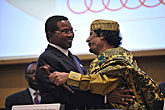Is there a meaning for the African Union?

Antumi Toasije suggests the AU is preventing Pan-African unity.
The present chairperson of the African Union is Teodoro Obiang Nguema. He is (by his own words) a dictator. This single fact is enough to widely discredit the AU. Recently Obiang – who has been in power in Equatorial Guinea since 1979 - tried to sponsor a Unesco prize in an attempt to buy prestige.
The AU was created with the objective of advancing towards a more united Africa. It followed the stagnation of the Organisation of African Unity that was created in 1963. However, since its formation the AU hasn't been capable of solving any of the major conflicts in Africa, notably in Congo, Sudan, Somalia and Cote d'Ivoire.
On 20 March, the AU committee on Libya demanded an immediate cessation of hostilities in the north African country. But in the United Nations Security Council, both South Africa and Gabón voted for an intervention in Libya that allows the bombing of the country.
So, caught in its own contradictions, what is left of the AU? The institutionalisation of Pan-Africanism has long ago demonstrated its futility. This is why many are asking if the AU is instead a way to delay the real African unity, the unity advocated by the real fathers of the Pan-African idea like Du Bois, Garvey and Nkrumah. This idea was really emancipatorary and pursued not only the independence, sovereignty and the unity of Africa, but also the freedom and well-being of all Africans, men and women.
BROUGHT TO YOU BY PAMBAZUKA NEWS
* Antumi Toasije is a Pan-Africanist historian, director of the Pan-African Studies Center in Spain (www.africologia.org) and the
Pan-African Center in Spain (www.wanafrika.org).
* Please send comments to [email protected] or comment online at Pambazuka News.
